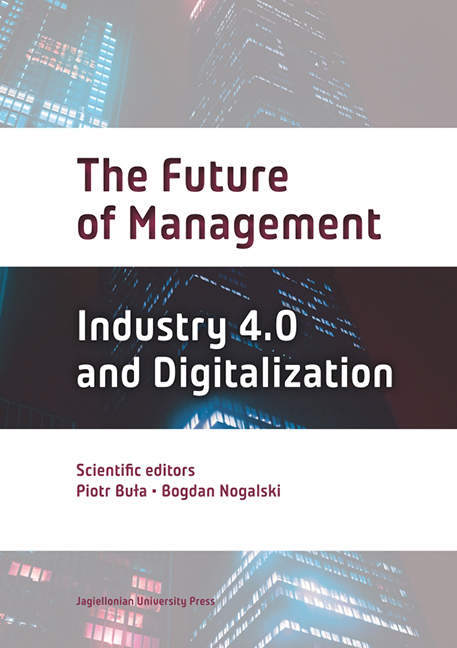Book contents
- Frontmatter
- Contents
- Preface
- Industry 4.0: Social Impacts and Operations Management Challenges
- Business Model Changes in the Presence of Challenges Brought by Industry 4.0
- Communication in Traditional and Network Organisation: Transformation
- Consequences of the Fourth Industrial Revolution in Social and Economic Development in the 21st Century
- Ideology, Trust, and Spirituality: A Framework for Management Control Research in the Era of Industry 4.0
- Renewable Energy through Industry 4.0 on the Example of Photovoltaic Development in Selected European Countries
- Employee Loyalty in the ICT Sector as a Challenge for Building Industry 4.0
- The Importance of Flexibility of Human, Tangible and Intangible Resources in Selected Production Entrepreneurships: Results of Empirical Research
- Challenges Posed for Universities by the Industry 4.0 Environment
- Big Data in Managing Marketing Communication
- Mathematical Risk Assessment Method in the Implementation of Logistic Processes
- Management and Digitisation
- Branding of Time as a New Direction in Tomorrow’s Management
- The Future of Branding
Employee Loyalty in the ICT Sector as a Challenge for Building Industry 4.0
Published online by Cambridge University Press: 16 November 2021
- Frontmatter
- Contents
- Preface
- Industry 4.0: Social Impacts and Operations Management Challenges
- Business Model Changes in the Presence of Challenges Brought by Industry 4.0
- Communication in Traditional and Network Organisation: Transformation
- Consequences of the Fourth Industrial Revolution in Social and Economic Development in the 21st Century
- Ideology, Trust, and Spirituality: A Framework for Management Control Research in the Era of Industry 4.0
- Renewable Energy through Industry 4.0 on the Example of Photovoltaic Development in Selected European Countries
- Employee Loyalty in the ICT Sector as a Challenge for Building Industry 4.0
- The Importance of Flexibility of Human, Tangible and Intangible Resources in Selected Production Entrepreneurships: Results of Empirical Research
- Challenges Posed for Universities by the Industry 4.0 Environment
- Big Data in Managing Marketing Communication
- Mathematical Risk Assessment Method in the Implementation of Logistic Processes
- Management and Digitisation
- Branding of Time as a New Direction in Tomorrow’s Management
- The Future of Branding
Summary
Abstract
Reflecting on employee loyalty in regards to persons from ICT appears to be valid at least for two reasons: firstly, as a professional group, they were (and in part of this group, will remain) the creators of Industry 4.0; secondly, the processes which are currently specific to employees of the ICT sector may, after several years, apply to larger professional groups. The text presents employee loyalty specific to employees of the ICT sector which can be described as a mercantile relationship focused on other professionals from the industry, and on one's own professional development. Conclusions on the nature of this loyalty are based on the author's own study. The text also presents the consequences of this specifically profiled loyalty of employees of the ICT sector at the organisational level, and with regard to the level of functioning of broader communities.
Keywords: employee loyalty, Industry 4.0, development, ICT sector, professional growth, organisation
Understanding loyalty
Loyalty as a concept is defined in a variety of ways. This is, on the one hand, due to the level of detail contained in the definition (from universal to detailed descriptions), while, on the other hand, loyalty is described within the bounds of different sciences, and therefore is referred to different and often overlapping areas (particularly in social sciences).
First of all, loyalty is a term defined by philosophy. For example, J. Royce defines loyalty as a dedication to a given cause both in the sphere of volition and action. Dictionary definitions remain on a similar level of universalism in description, but they also include functional aspects of loyalty, as for example J. Kleinig who mentions the importance of loyalty to maintain the functioning of the organisation, and maintaining the principle of reciprocity in social life.
From the definition of a universal nature we move to more detailed descriptions within individual social sciences. Thus, in psychology we can come across loyalty defined in, among others, social psychology and family psychology to the psychology of consumer behaviour. The subject of loyalty, e.g. in the design of the educational system and directions of education is also undertaken by pedagogy.
- Type
- Chapter
- Information
- The Future of ManagementVolume Two: Industry 4.0 and Digitalization, pp. 108 - 126Publisher: Jagiellonian University PressPrint publication year: 2022



